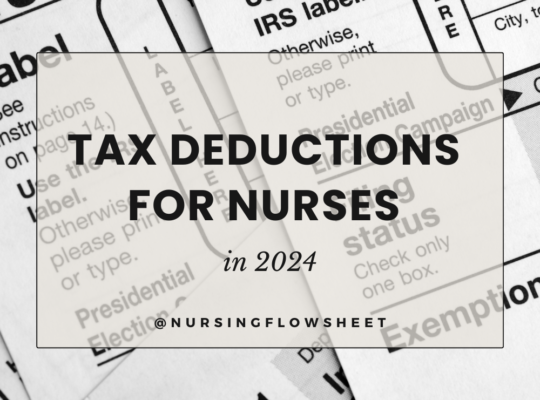It’s graduation season and if you’re a new grad nurse, you are starting to embark on a new chapter your life! Congratulations! As you embark on this rewarding career, it’s important to establish good financial habits early on. Managing your finances effectively can help you achieve long-term financial stability and build wealth. Here are some practical tips to guide you on your financial journey.
1. Create a Budget
A budget is the foundation of financial health. Start by tracking your income and expenses. List all sources of income, including your salary and any side jobs. Then, categorize your expenses: essentials (rent, utilities, groceries), non-essentials (entertainment, dining out), and savings.
Tips:
- Use budgeting apps like YNAB (You Need A Budget), Empower, or EveryDollar to simplify the process. I personally use EMPOWER as it’s free and also email you daily transactions and a report of your financial health.
- Aim to follow the 50/30/20 rule: 50% of your income for needs, 30% for wants, and 20% for savings and debt repayment.
- READ Budgeting for Beginners
2. Build an Emergency Fund
Life is unpredictable, and having an emergency fund can provide a safety net for unexpected expenses such as car repairs, medical bills, or job loss. Aim to save at least three to six months’ worth of living expenses.
Tips:
- Start small if necessary. Even saving $500 can make a difference.
- Set up automatic transfers to a high-yield savings account to build your fund gradually.
3. Manage Student Loans
Many new grad nurses have student loans. Developing a repayment strategy is crucial to avoid financial strain.
Tips:
- Explore different repayment plans such as Income-Driven Repayment (IDR) plans, which adjust your monthly payment based on your income.
- Look into loan forgiveness programs like the Public Service Loan Forgiveness (PSLF) if you work for a qualifying employer.
4. Live Below Your Means
While it might be tempting to upgrade your lifestyle with your new income, living below your means is key to saving and investing.
Tips:
- Avoid lifestyle inflation. Just because you earn more doesn’t mean you should spend more.
- Prioritize spending on experiences and things that truly add value to your life.
5. Invest Early and Regularly
Investing is one of the most effective ways to build wealth over time. The earlier you start, the more you can benefit from compound interest.
Tips:
- Take advantage of employer-sponsored retirement plans like a 401(k) or 403(b). Contribute enough to get any employer match, as this is essentially free money.
- Open an Individual Retirement Account (IRA) if you don’t have access to an employer-sponsored plan. Consider a Roth IRA for tax-free growth and withdrawals in retirement.
- Invest in low-cost index funds or exchange-traded funds (ETFs) to diversify your portfolio.
6. Continue Your Education and Training
Investing in your education and professional development can lead to higher earning potential.
Tips:
- Consider pursuing advanced certifications or a master’s degree in nursing.
- Take advantage of tuition reimbursement programs if your employer offers them.
7. Seek Professional Financial Advice
A financial advisor can help you create a personalized plan to achieve your financial goals.
Tips:
- Look for a fiduciary financial advisor who is legally obligated to act in your best interest.
- Utilize resources like the National Association of Personal Financial Advisors (NAPFA) to find a fee-only advisor.
8. Protect Your Income and Assets
Insurance is an essential part of financial planning. Make sure you have adequate coverage to protect yourself and your family.
Tips:
- Consider disability insurance to protect your income in case you can’t work due to illness or injury.
- Purchase health, auto, renters, or homeowners insurance as needed.
- Start thinking about life insurance, especially if you have dependents.
- Read: How to Get Started with Investing as a Nurse
Lastly, where you are in one month is not where you will be in 10 years. Remember that you will find a nursing job that you can love, suits with your lifestyle and also something you can leverage to truly build wealth. It took me more than a decade to find that place. You will also get there!


Starting your career as a nurse is an exciting milestone, and establishing good financial habits early on will set you up for long-term success. By creating a budget, building an emergency fund, managing your debt, living below your means, investing wisely, continuing your education, seeking professional advice, and protecting your income and assets, you can build a strong financial foundation and achieve your wealth-building goals. Here’s to a prosperous future as you care for others and secure your own financial well-being!








